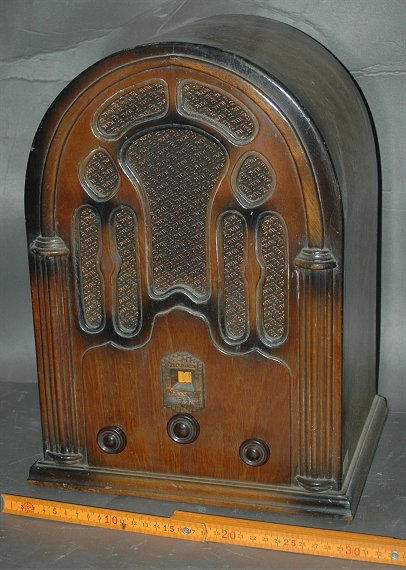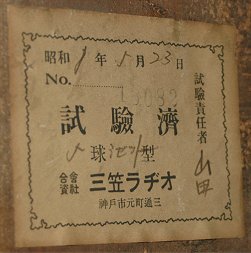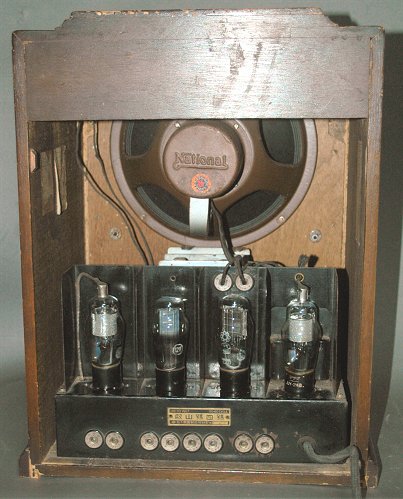

Cathedral Tombstone and Midget radio
-1931-36-
In 1920s, Early speaker was placed outside of radio set.
From late 1920s, horn speaker changed into cone speaker.
From early 1930s, the shape of radio cabinet changed into new style that was installed speaker inside.
Early inside speaker set used “cathedral” shaped cabinet.
Until mid 1930s, “cathedral” changed into “tombstone” shaped cabinet.
From 1935 small horizontal table radio were available.
In Japan, Only one small table-top type set was used at the most of homes.
There were only few music programs. Console radio did not exist except a few radio phonographs.
Under the depression, low price small set was prevailed. These small radios
were called "midget".
In Japan, Not only small table-top set but also cathedral shaped set called
"midget".
The line up of prevailed midget set was as follows,
227-112A-112B (Grid detector regenerative, transformer coupled)
227-247B-112B (Grid detector regenerative, Register coupled pentode amplifier)
227-226-112A-112B (Grid detector regenerative, transformer coupled)
Low cost set used magnetic speaker.
High grade set was as follows,
224-224-247B-112B (TRF, 1-V-1, regenerative, Magnetic or small dynamic speaker)
235-235-224-247B-280B (TRF, 2-V-1, Dynamic speaker)
High grade set had input terminal for pick up to play record.
A few super heterodyne set existed as hi-end model.
Manufacturing small chassis was difficult to amateur or small manufacturer.
Classic style AC set wired on the “bread board” was manufactured until late 1930’s.
Under the depression, radio was prevailed as a new economical amusement
at home.
In 1931, listeners were over 1 million. 2 years later it amounted to 1,700,000.
Radio had spread at city area, however, in the country area, only 10% of
all households had radio in 1932.
Late 1930s, midget and tombstone shape changed into horizontal table radio.
NOTICE:
Gothic is latest updates.
Japanese terms or company
names that is untranslatable are shown in spelled in Italics.
When not mentioned specially, all prices are original retail price.
Cathedrals and Tombstones (Made in Japan)
ARIA Model 27 Type B Chassis 4-Tubes Regenerative Mitaka Denki Seisakusho 1935 Whole-sale Price JPY 7.80 (Chassis only)
Orion Model 2 4-Tubes Regenerative Tokyo Electric Co., 1930?
Caravan Model L2 Chassis M-30 3-Tubes Regenerative Haraguchi Denki Seisakusho 1932? JPY 24.00
Crown Model 412 Type A 4-Tubes Regenerative The Nihon Seiki Co., Ltd. 1936 JPY 26.00 (Link)
Concertone Model B (RR-401) 4-Tubes Regenerative Ryobi Denki ShokaiI Ltd. 1931-32 JPY 48.00
CONDOR Model 700 4-Tubes Regenerative with RF T.H.S. Radio Products 1936?
Sharp Model 48 4-Tubes with RF Regenerative Hayakawa Metal Works 1936 JPY 48.00 (Link)
SINGER ”VICTOR” 3-Tubes Regenerative Sankyo Denki Seisakusho 1932?
TELEVIAN Model M-235 5-Tubes Regenerative with 2-RF Yamanaka Electric Co., Ltd. 1933-34
TELEVIAN Model M-48号/Seinen-dan type 4-A 4-Tubes Regenerative with RF Yamanaka Electric Co., Ltd. 1936-39 (Link)
National Model R-48("Liner" type) 4-Tubes Regenerative with RF Matsushita Denki Seisakusho 1935-37 JPY 45.00 (Link)
National "Eizan-go" Model4 4-Tubes Regenerative with RF Matsushita Denki Seisakusho 1935 JPY 50.00 (Variation of Model R-48)
Nanaora Model 44 4-Tubes Regenerative with RF Nanao Radio Co., 1934?
Nanaora Model 84 4-Tubes Regenerative with RF Nanao Radio Co., 1936 JPY 52.80 (Link)
Hermes Model 24A 4-Tubes Regenerative Osaka Musen K.K. 1937 JPY 32.00 (Link)
Mikasa 5-Tubes midget 5-Tubes Regenerative with 2-RF Mikasa Radio 1933
Takachiho No.24 4-Tubes "Non Interference"Regenerative Houden Mubougai Jyusinki Seisakusho 1935?
Universal Model R-50 4-Tubes Regenerative with RF Radio Electric Co., Ltd. 1935?
Royal Model M61 6-Tubes Superheterodyne Harasaki Musen Kogyo K.K. 1935?
Midget set (Made in Japan)
Aria Model R-1 4-Tubes Regenerative Mitaka Denki K.K. 1936 JPY 34.00 (Link)
Elgo Type No.410 4-Tubes "Non Interference"Regenerative Kimura Denki & Co., Ltd. 1936
National Model R-40 4-Tubes Regenerative with RF Matsushita Denki Seisakusho 1935
National Model K-5 3-Tubes Regenerative Matsushita Radio MFG.Co., 1936 JPY 27.00 (Link)
Hermes No.4 4-Tubes Regenerative Osaka Henatsuki K.K. 1935 (Link)
Rising Model S2 3-Tubes Regenerative San Denchi Seisakusho & Co., Ltd. 1936?
HY Model unknown 3-Tubes Regenerative Yamamoto Kinzoku Kogyosho 1936?
Small Size or Special Function
River POCKET RADIO MODEL 500-P 3-Tubes Regenerative, KAWA RADIO WORKS 1934
VENICE Model unknown 4-Tubes Regenerative MIKADO ELECTRIC LAB. 1936?
Yoshida-shiki Stand Radio 4-Tubes TRF with Desk Lamp Nippon Denpa 1935-37? JPY 65.00
Cathedral and Tombstone (Made in Foreign Countries)
Philco Model 57C Junior Compact 4-Tubes 2 band Superheterodyne Philaderphia Storage Battery Co.(U.S.A) 1933
RCA Victor model 5T 5-Tubes 2 band Superheterodyne RCA Manufacturing Co., (U.S.A.) 1936
Midget set (Made in Foreign Countries)
Philco Model89 Code123 6-Tubes 2 band Superheterodyne Philaderphia Storage Battery Co.(U.S.A) 1934
RCA Victor R-17-M 4-Tubes Regenerative with RF (Transformer-less) RCA Victor Co., (U.S.A.) 1934
Cathedrals and Tombstones (Made in Japan)
Orion Model 2) 4-Tubes Regenerative (Tokyo Electric Co., Ltd. 1930?)


TUBES: 227-226-226-112B, Regenerative, 1-V-1, Magnetic Speaker
Tokyo Electric (Toshiba now) was top manufacturer of tubes in Japan.
Orion was brand of Tokyo Electric’s radio. However, all Orion radio was
OEM product.
Tokyo Electric supplied tubes to many radio manufacturers.
To avoid competition, Tokyo Electric did not manufactured own radio set.
Orion radio faded out at the short time.
Toshiba manufactured own radio set from 1946.
Knobs and ornament at the bottom of front panel were missing.
(Collection No.11512)
Concertone Model B (RR-401) 4-Tubes Regenerative Ryobi Denki ShokaiI Ltd. 1931-32 JPY 48.00



TUBES: 227-226-112A-112B, Regenerative,0-V-2, Magnetic Speaker (Hudson
Model B)
Mitsubishi started manufacturing of radio licensed from Westinghouse Co.,
Radio set was supplied as OEM by Tiger Battery Works and sold by Ryobi Denki Shokai Ltd.
Mitsubishi named their radio set “Concertone” .
In 1936, Mitsubishi Electric transferred the all rights of Concertone radio
to Tiger Battery Works. Tiger battery Works changed their company name
into Tiger Electric Co., They started production of original designed radio.
Mitsubishi electric faded out from radio industry. They returned in 1946 as “Diatone” radio.
(Collection No.11365)
Caravan Model L2 Chassis M-30 3-Tubes Regenerative Haraguchi Denki Seisakusho 1932? JPY 24.00



TUBES: 227-112A-112B, Regenerative, 1-V-1 , Magnetic Speaker
This was standard small “cathedral” styled set.
Circuit was grid detector and transformer coupled amplifier.
Tube is missing. Chassis was corroded.
(Collection No.11006)
Singer ”VICTOR” 3-Tubes Regenerative (Sankyo Denki Seisakusho 1932?)


TUBES: 227-112A-112B, Regenerative, 1-V-1 , Magnetic Speaker
Singer was top brand of AC set at early 1930’s.
The name “Victor” had no relation to famous talking machine.
The manufacturer Sankyo Seiki bankrupted in 1934 and transferred to The
Nihon Seiki Co., Ltd.
(Collection No.11399)
Mikasa 5-Tubes midget 5-Tubes Regenerative with 2-RF Mikasa Radio 1933



TUBES: 224-235-235-247B-280B, TRF, 2-V-1, Magnetic Speaker
Small manufacturer’s high grade set.
Speaker was unoriginal. Rectifier tube is missing.
(Collection No.11005)
Televian Model M-235 5-Tubes Regenerative with 2-RF Yamanaka Electric Co., Ltd. 1933-34 JPY 94.00




Original ad. (from Radio no Nippon 01/1934) Modfied chassis
TUBES: 235-235-224-247-280, TRF, 2-V-1, ELectro-dynamic Speaker, W420,
H520, D280 (mm)
This was hi-end set of Yamanaka Electric.
Original circuit was 5 tubes TRF with 2 stage RF amp.
This example was modified several times.
In the late of 1930’s, dial was changed into airplane type.
After the war, circuit was modified into super heterodyne.
The lineup after modification : 3WC5-57S-3ZDH3A-3YP1-80
3WC5 and 3ZDH3A was 2.5V variation of 6WC5 and 6ZDH3A.
These tubes were sold for modification of old radio.
Speaker was missing.
(Collection No.11672)
Nanaola No.44 4-Tubes Regenerative with RF (Nanao Radio Co., 1934?)



TUBES: 224-224-247B-112B, TRF, 1-V-1, Magnetic Speaker
The model 44 was middle class TRF set of Nanao Radio.
The nameplate “JODK” was indicated on front panel.
JODK started in Keijyo (now Seoul) Korea as a 4 th Japanese broadcasting station in 1926.
JODK suspended in the end of WWII and fade out. JODK do not use in Japan now.
(Collection No.11349)
National Model "eizan-go" Model 4 4-Tubes Regenerative with RF Matsushita Denki Seisakusho 1935 JPY 50.00 (Variation of Model R-48)



TUBES: 24B-24B-47B-12B, TRF, 1-V-1, Magnetic Speaker
Model R-48 was first best seller of Matsushita radio.
Quality is better than other manufacturer’s products.
The “Eizan-go” was variation model of model R-48 for the membership radio
shop in Kyoto of Matsushita monthly installment plan.
(Collection No.11667)
ARIA Model 27B 4-Tubes Regenerative Mitaka Denki Seisakusho 1935 Whole-sale Price JPY 7.80 (Chassis only)



TUBES: 27A-26B-26B-12B, 0-V-2, Magnetic Speaker
Mikata Electric was one of leading radio manufacturer.
Model 27 type B was sold as complete set and chassis only.
This set was combined chassis and other small manufacturer’s cabinet to reduce cost.
Audio transformer and antenna coil was replaced. 27A was missing.
(Collection No.11321)
Takachiho No.24 4-Tubes "Non Interference"Regenerative, Houden Mubougai Jyusinki Seisakusho 1935, JPY 35.00




TUBES: 24B-26B-12A-12B , 0-V-2, Magnetic Speaker
This model was one of the “Non interference” regenerative set.
Most prevailed 0-V-2 radio has no volume control.
Volume was controlled by tickler knob.
This control was difficult and stability of set was poor.
Regenerative set sometimes oscillated and caused interference to another radio sets.
NHK was having much trouble in dealing with the matter.
Ministry of telecommunication and NHK recommended “ No interference regenerative set”.
This model was used the type N.E. circuit winning NHK’s contest in 1934.
“ No interference regenerative set” had limited or pre-set tickler control.
Manufacturer of this set tried to put many non interference regenerative set into market, however, sensitivity was lower than ordinary regenerative set.
“ No interference regenerative set” did not prevailed.
This set was renovated using wrong new parts and non-original circuit.
Knobs and net were unoriginal.
(Collection No.11840)
Universal Model R-50) 4-Tubes Regenerative with RF (Radio Electric Co., Ltd. 1935?)



TUBES: 224-224-247B-112B, 1-V-1, Magnetic Speaker
Radio Electric Co., Ltd. was ancient company of Japanese radio industry.
They were known as “Akamon” brand.
This model was latest model of their products.
Typical tombstone TRF set.
(Collection No.11513)
Royal Model M61 6-Tubes Superheterodyne (Harasaki Musen Kogyo K.K. 1935?)


TUbes: 27A-58-58-2A6-247B-280B, Electro-dynamic Speaker
Harasaki Musen manufactured many high-grade super heterodyne sets.
Japanese tombstone shaped super heterodyne set was rare.
This set was modified tubes into 6D6-6L7G-37A-6D6-6B7-42-80.
(Collection No.11541)
Condor Model 700 4-Tubes Regenerative with RF (T.H.S.Radio Products 1936?)


TUBES: 24B-24B-47B-12B, 1-V-1, Magnetic Speaker
Condor was the brand of ancient manufacturer T.H.S. Radio Products.
Cabinet was inspired from Art Deco style.
1940’s Paper framed speaker was unoriginal. 47B was replaced to 3YP1.
(Collection No.11429)
Midget set (Made in Japan)
National Model R-40 4-Tubes Regenerative with RF Matsushita Denki Seisakusho 1935 JPY 65.00



TUBES: 58-58-47-80B, TRF, Electro-dynamic Speaker
This set was Matsushita ‘s high-grade midget radio.
New tubes 58 and 47 were used.
Such small set that used dynamic speaker and power tube 47 was very rare.
This set was modified into super heterodyne circuit in 1950’s.
(Modified line up: 6WC5-58-57-2A5-80)
(Collection No.11207)
Ergo Type No.410 4-Tubes "Non Interference"Regenerative Kimura Denki & Co., Ltd. 1936



TUBES: 24B-26B-12A-12B, 0-V-2, Magnetic Speaker
This model was small manufacturer's “Non interference” regenerative set.
Most prevailed 0-V-2 radio has no volume control.
Volume was controlled by tickler knob.
This control was difficult and stability of set was poor.
Regenerative set sometimes oscillated and caused interference to another radio sets.
NHK was having much trouble in dealing with the matter.
Ministry of telecommunication and NHK recommended “ No interference regenerative set”.
This model was used the patent No.105892 registered by Electrotechnical
Laboratory.
“ No interference regenerative set” had limited or pre-set tickler control.
Manufacturers tried to put many non interference regenerative set into
market, however, sensitivity was lower than ordinary regenerative set.
“ No interference regenerative set” did not prevailed.
(Collection No.11283)
HY Model unknown 4-Tubes Regenerative Yamamoto Kinzoku kogyosho 1936?


TUBES: 27A-26B-12A-12B, 0-V-2, Magnetic Speaker (Star No.50 by Yamamoto,
Approved No.: 21053)
Small manufacturer’s typical 4 tubes midget set. Approved speaker used.
The cost of approved radio was expensive. To avoid high price, many “approved parts used” set existed. These set used approved main parts such as speaker, power transformer.
The power transformer, tubes, power awitch and power line cable were replaced
at 1950’s.
The condition of cabinet was fear.
(Collection No.11592)
Rising Model S2 3-Tubes Regenerative Sun Denchi Seisakusho & Co.,Ltd. 1936?


TUBES: 24B-47B-12B, 0-V-1, Magnetic Speaker
This was small manufacturer’s typical 3 tubes midget set.
Sensitivity was lower than 4 tubes set.
Such small set was mainly used in city area.
(Collection No.11593)
Small Size or Special Function
River POCKET RADIO MODEL 500-P 3-Tubes Regenerative KAWA RADIO WORKS 1934





TUBES: 24B-12A-12B, 0-V-1, Magnetic Speaker, W140XH210XD100(mm)
This set is one of the Japanese small radio at pre war era.
This model was inspired from Kadette Model F
"Junior" (external link) in 1933.
River radio was 3 tubes AC set with wooden cabinet larger than Kadette Junior.
All control knobs and terminals placed on the back of cabinet.
Power switch installed at the AC power line cable.
Nameplate was described in English. Line voltage was stamped later.
Manufacturer concerned export this radio.
(Collection No.11823)
VENICE Model unknown 4-Tubes Regenerative Mikado Electric Lab. 1936?




TUBES: 27A-26B-26B-12F, 0-V-2, 5" Magnetic Speaker, Metal Cabinet
This model was smallest Japanese set at pre war era.
No nameplate or label on this example.
Brand and manufacture described above were referenced from the same set stored other collection.
Chassis could not separate from cabinet. Serviceability was poor.
(Collection No.11745)
Yoshida-shiki Stand Radio 4-Tubes TRF with Desk Lamp Nippon Denpa 1935-37? JPY 65.00



Front View (Left), Speaker in the top cover (Middle), Socket on Top (Right)

TUBES: 24B 24B 47B 12B (Modified into 57S 56 56 12F ), Magnetic Speaker
This set was combined desk lamp and TRF 4 tubes radio. Cabinet was made
by bronze plated brass. All parts were constructed by soldering.
Tubes were installed in the posts at the four corners.
Speaker and lamp holder was installed in the top cover and connected by
2 round shaped connector.
All parts of radio was installed in the base of set. Size of chassis was
W230 X H50 X D230(mm). Height of chassis was limited. Gang variable capacitor
could not used. RF and tuning control was independent. The Q of coils were
reduced by metal chassis and no regenerative circuit and tickler control.
Sensitivity was poor. Some variation of this model existed.
This model discontinued by war. After WWII manufacture was resumed at same style and continued until 1950’s.
In 1950’s, this example was dismantled all parts and reconstructed into regenerative set. No original parts except power transformer.
The lineup of tubes were 57S 56 56 12F. 3 covers of tubes were missing.
(Collection No.11879)
Cathedral and Tombstone (Made in Foreign Countries)
Philco Model89 Code123 6-Tubes 2 band Superheterodyne Philaderphia Storage Battery Co.(U.S.A) 1934



TUBES: 44 - 77 - 44 - 75 - 42 - 80
アメリカの代表的ブランド、フィルコのミゼット型受信機。カテドラル型と呼ばれるタイプの受信機の代表的なもの。同社のセットの中では比較的小型のモデルである。同じようなサイズの国産品は、せいぜい高一程度の内容だが、これは6球スーパーである。シャーシの構造や使用部品のレベルは日本製品より数年先を行っている。真空管は6.3V管を使用し、フィールド型ダイナミックを駆動する。通常の中波のほかに、1.5-3.2Mcの短波帯を受信できる。このバンドは警察無線、初期のテレビ音声が割り当てられていた。Model
89 には、多くのバリエーションがあり、Code123に限ってもキャビネットのデザインが数種類ある。
本機はサランネットが破損し、スピーカがオリジナルでない。
(Collection No.11660)
RCA Victor model 5T 5-Tubes 2 band Superheterodyne RCA Manufacturing Co., 1936


TUBES: 6A7-6D6-75-42-80, Electro-dynmic Speaker
RCAの中級2バンドスーパー。中波のほかに1.8-6Mcの短波を受信できる。このバンドには警察無線、航空無線、アマチュア無線が含まれる。6.3V系の配列で、8インチフィールド型ダイナミックを駆動する。この回路は、戦後日本で一般的になった「5球スーパー」の回路である。
(Collection No.11716)
Midget set (Made in Foreign Countries)
Philco Model 57C Junior Compact 4-Tubes 2 band Superheterodyne Philaderphia Storage Battery Co.(U.S.A) 1933 $15


TUBES: 77-77-42-80, Electro-dynmic Speaker
アメリカの大手メーカー、フィルコの小型受信機。6.3V球を使ったトランス式4球スーパー。小型のフィールド型ダイナミックを駆動する。通常の中波のほかに、1.5-3.2Mcの短波帯を受信できる。このバンドは警察無線、初期のテレビ音声が割り当てられていた。このセットは同社で初めてULの安全認証を受けたものという。幅30cm、奥行き13cmの小さなキャビネットに、日本では大型のラジオにしか使われない42-80を使ったスーパーの回路が納められているため、放熱には十分な配慮がなされている。日本ではこの時代にこのサイズでは、並四受信機さえ作ることはできなかった。このセットは、ライバルのエマーソンの小型受信機ががTRFだったのに対し、安価な小型受信機ながらスーパーだったためにベストセラーとなり、1年で11万台以上生産された。
(Collection No.11715)
RCA Victor R-17-M 4-Tubes Regenerative with RF (Transformer-less) RCA Victor Co., (U.S.A.) 1934


TUBES: 39-36-38-37, TRF, Permanent Dynamic Speaker
金属キャビネットに収められたトランスレス4球高一受信機。小型のパーマネント・ダイナミックを駆動する。整流管は3極管37の2極管接続である。6.3V管を使っているため、ヒータ電圧の足りない分は、大型の抵抗器で消費している。小型のバリコン、ハイ・インピーダンス型のコイルなど、日本の製品とは技術レベルが違うことがわかる。日本ではこのデザインとまったく同じものを廣瀬商会が1934年に発売した。こちらは227-226-112A-112Bのトランス式再生検波で、このデザインを「国旗を象徴した」デザインと称し、NIPPON号と名付けた。NIPPON号のほうは、サイズが若干大きくなっている。
(Collection No.11468)